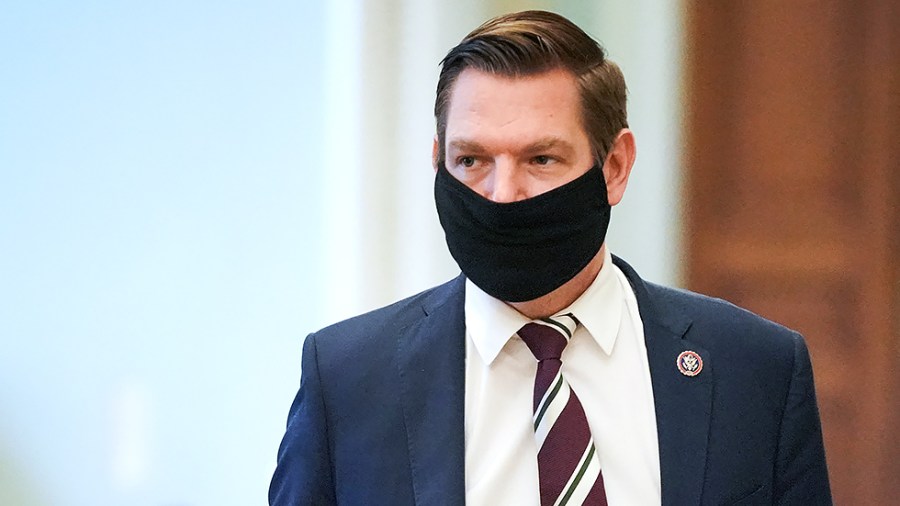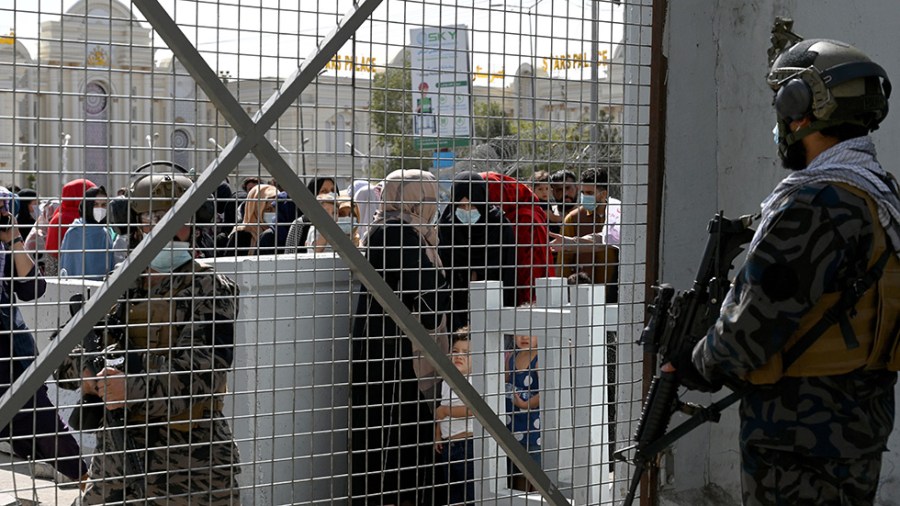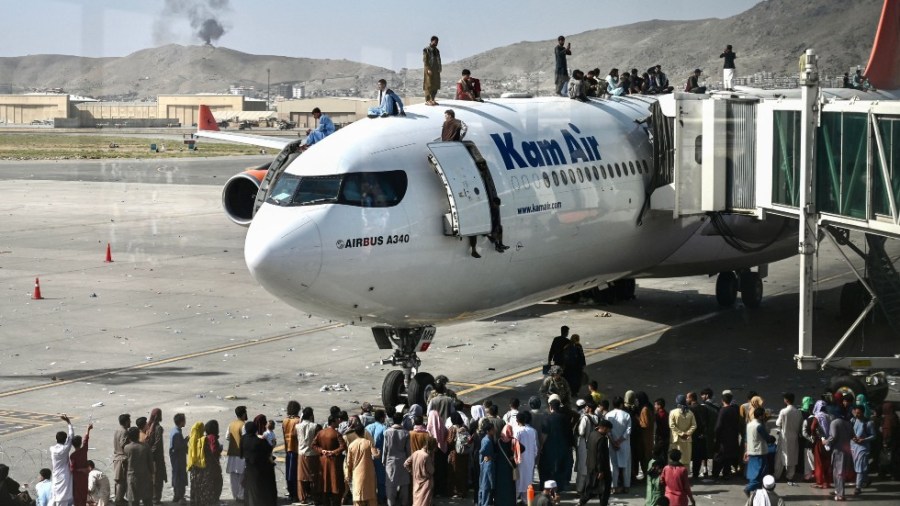How lawmakers aided the Afghan evacuation
Congressional offices went to extraordinary measures to help in the evacuation effort of Americans and vulnerable Afghans stuck in Afghanistan amid the Taliban’s takeover of the country last month.
While Kabul’s quick fall shocked the world, Senate and House lawmakers soon found their offices overwhelmed with desperate pleas from Afghan Americans, military veterans of the war in Afghanistan, workers of nongovernmental organizations and others scrambling for contacts to save people stranded in the country suddenly under the rule of a terrorist organization.
The Hill spoke to nearly 20 lawmakers and staffers in both parties about what their offices went through over the fraught two weeks between when Kabul first fell, on Aug. 15, and the last U.S. military flight, just before midnight Aug. 30.
The mission was personal for many of them: Some are veterans, or relatives of veterans, of the 20-year war, and some had even worked with local interpreters whom they considered key to their survival.
Lawmakers and staffers also said they felt obligated to answer requests from constituents as well as those beyond their districts looking for help. Many offices found success in helping people evacuate, but those victories are dampened by the sheer numbers of people left behind.
While the administration evacuated about 125,000 people from Afghanistan last month, independent analysts estimate that more than 100,000 people who fall into a priority for evacuation were left behind.
“It was tough, honestly. I was in communication with probably five to 10 people on the ground in Kabul and that was just emotionally frustrating and demoralizing,” Rep. Eric Swalwell (D-Calif.), whose district includes one of the largest Afghan American communities in the U.S., said in an interview with The Hill.
“My staff, they were in contact with almost 1,000 times that, so for them it was even worse. We all felt helpless more times than we felt like we were successful,” he said. “But success stories propelled us forward, and I kept telling my staff that soon we will be able to meet many of the people we helped face-to-face and that itself will be fulfilling.”
But others said their work on evacuations is still weighing on them.
“There’s a bit of … let’s say guilt. We had a big role to play. We did save a lot of lives. But it was very emotionally stressful — when you’re making life and death decisions and pleading with people on the ground at the airport itself to let these people in,” Rep. Michael McCaul (R-Texas), ranking member of the House Foreign Affairs Committee, told The Hill.
“Because you know if they get in, they will escape. And if they don’t get in, they will die,” he said.

© Getty Images
‘The human element’
Lawmakers and staffers faced high stakes and overwhelming requests once the country was quickly taken over by the Taliban.
For many, the frantic calls and emotional stories made the casework deeply personal, with tens of thousands of Afghans who served alongside U.S. and international forces stuck in their efforts to receive a special immigrant visa (SIV) and secure safe passage out of the country.
Rep. Gerry Connolly (D-Va.) had spent months trying to help one SIV applicant, Dellawar Khan, get the proof of employment needed to leave the country. But the situation became dire as the evacuation deadline approached. A final letter pushed Khan’s employer to acknowledge his service, with Connolly vouching for him on official letterhead that got Khan through Taliban checkpoints.
“We were able to get him on a plane and the only reason he was able to get on the plane — and he had to leave his wife and nine children behind — but the only reason he’s out is because Gerry Connolly wrote him a letter,” said Keith Saddler, vice chair for the board of No One Left Behind, which helps assist former interpreters looking to get SIVs.
Connolly’s office also helped forward to the State Department the names of family members of his former political opponent Zainab Mohsini, an Afghan American woman he ran against in last year’s Democratic primary.
“It was kind of a privilege to be able to do that. Politics have to be put aside in the midst of this humanitarian crisis,” Connolly told The Hill in an interview.

“The human element of this crisis was paramount, and the individual stories really stuck with you. And that sense of urgency. We’ve got to do this; we’ve got to drop everything and make this a priority, because this opportunity is going to slip away,” he said.
Rep. Abigail Spanberger (D-Va.) said her office was contacted by Afghan Americans, including some former interpreters who had already received SIVs, who suddenly found themselves trapped in the country.
“They knew that ultimately the window for visiting Afghanistan or their country of origin might be closing but wanted to go back and see family, be part of family celebrations,” Spanberger, a former CIA operations officer, told The Hill.
“[They were having] lovely visits with family members and then all of a sudden the government collapsed and knowing that they had left Afghanistan as SIVs, that they had worked for the American government, that they had relocated to the United States, they restarted their lives. They already had that dream scenario and then it was in jeopardy. Those were the terrified, terrified people trying to figure out what to do,” she said.
Rep. Michael Waltz (R-Fla.), a former Army Green Beret who served in Afghanistan, shifted some of his staff to Afghanistan time to have 24/7 operations as he was contacted by former associates.
“We just received a flood of panicked requests. And they weren’t just random requests. These were people I had known or worked with and fought with or tried to improve the country with over time, so it was very personal,” he told The Hill.
“On any given hour, I was somewhere on a spectrum between rage and grief,” he said.

© Greg Nash
Working the official channels
Congressional offices received tens of thousands of texts, phone calls and emails from desperate constituents and loose contacts looking for help.
Lawmakers in some offices were left to craft a whole new constituent operation practically overnight while others concentrated on forwarding names to a completely inundated State Department.
Swalwell’s office worked some 6,000 different cases, taking referrals not just from the Little Kabul neighborhood he represents, but from across the country.
“We had so many cases, and not only so many cases just in our district, but because we were working on a lot of cases and because we were having some success the word spread, not just domestically but internationally, that we were the office to go to. So, we had Afghans from all over the country contacting our office. We had open office hours for these cases, and we had a family drive from Kentucky, a family drive from Utah, a family drive from San Diego,” he said.
Rep. Andy Kim’s (D-N.J.) office, which set up a general email for people to forward names to the State Department, passed along more than 11,000 names while Connolly’s office forwarded 20,000.
According to the State Department, hundreds of lawmakers forwarded thousands of names to their office.
Secretary of State Antony Blinken, in an appearance before the House Foreign Affairs Committee on Monday, held up a thick stack of paper, which he said represented 26,000 cases forwarded by congressional offices, adding that State has responded to 21,000 of them.
“Congressman [Brian] Fitzpatrick [R-Pa.] worked with the State Department to reunite an Afghan family in New Jersey. Congressman [Bill] Keating [D-Mass.] worked with our folks on the ground to help a Voice of America reporter and his family get to the airport. Congresswoman [Sara] Jacobs [D-Calif.] and Congressman [Darrell] Issa [R-Calif.] worked across party lines to draw attention to cases of legal permanent residents and Afghans at risk,” he said at the hearing.
“Please know that your emails and calls made a real difference in getting people out, and we continue to use your lists and your information in this next phase of our mission,” he added.
Some lawmakers and staff saw the requests to their offices as a reflection of failure by the State Department.
“Our offices were flooded with requests to help people get out of Afghanistan, requests that were coming to us because the State Department failed,” McCaul told Blinken at the hearing.
McCaul told The Hill his office turned to outside groups such as Digital Dunkirk and Pineapple Express, volunteer-led groups of veterans and others who worked outside the government to evacuate people from Afghanistan, to help assist with evacuating people who reached out to his office but were not being assisted by State.
“We in many respects had to take it into our own hands and become our own kind of mini State Departments,” he said, calling his committee a clearinghouse for members working to get people out.
Others felt State was effective, but only with prodding.
Many offices also grew frustrated with a State Department drowning in data, juggling multiple spreadsheets and forms that quickly populated with repeat names.
Several staffers said State, though communicative, was asking for too much follow-up documentation for people in crisis.
“What State was requesting for us to provide for people fleeing was not reasonable to request given the conditions — this isn’t like going to the DMV. These people are feeling the Taliban,” said one staffer whose office succeeded in getting 35 people out of the country out of more than 150 cases they were working on.
Swalwell blamed former President Trump for stalling processing of SIVs, compounding the pressure on the evacuation. An inspector general report published in June 2020 found a backlog of 18,000 SIV applicants and a system that was overburdened and under-resourced.
“Look, they were completely overwhelmed,” Swalwell said of the State Department. “This program was not designed to be a mass evacuation exercise.”
One Republican Senate aide, who asked for anonymity to protect their work on evacuations, said nongovernmental organizations (NGOs) and other groups working to get people out abandoned coordination with the Biden administration and went directly to the Qatari government for help with evacuations.
Qatar has played an outsized role in the U.S. evacuation effort, since it was one of the few countries to maintain its embassy operations in Kabul and has close communication with the Taliban, which holds an office in the Qatari capital of Doha.
Qatari officials on the ground in Afghanistan reportedly helped transport at least 3,000 people through treacherous Taliban checkpoints and dangerous crowds to reach the airport.
Its national carrier, Qatar Airways, has also run charter evacuation flights, and the country has hosted up to 58,000 evacuees on the Al Udeid Air Base in Doha, where the U.S. military has a long-standing presence.
“I know a lot of NGOs worked with the Qataris to try to get charter planes full of people out. Some of which were successful, some weren’t, but a lot of people stopped trying to talk to the U.S. government, or they talked to the U.S. government but then worked around the U.S. government to get people out,” the Senate GOP aide said.
The aide added that other U.S. government agencies bypassed the State Department and reached out to their office directly for help in evacuating high priority Afghans, including government officials who could lead the Taliban to a potential windfall by subverting international sanctions and blocks to access millions of dollars.
“A number of these Afghan officials were back-channeled to us by other U.S. government agencies because the U.S. government and the interagency didn’t lift a single finger to try to do anything to help get them out,” the aide said. “We stepped in to try and help get some of those people out.”

© Getty Images
A whisper network
Lawmakers quickly surmised they would need to use a variety of methods to try to shepherd people out of the country.
“I think we realized that it took a Swiss army knife to try and solve this problem so sometimes we’d go to the State channel that we had,” Swalwell said. “We had developed contacts on the ground through [the Department of Defense] DOD. And then some people had found their way to get in direct contact with me, and so I was working through other colleagues of mine who are veterans who had other means on the ground to move people to and through the gates.”
One GOP staffer also went through their own rolodex to help an interpreter who worked with their cousin during his time in Afghanistan.

“I started reaching out to others, starting with reporters I knew who had been to Afghanistan or were familiar with the country, and who had already had some success getting their people out. I thought if I could figure out what they did, I could replicate it,” the staffer said.
Another Democratic office that spoke with The Hill on the condition of anonymity recounted their involvement in special operations, working with third countries to airlift “thousands of desperate Afghans, many, many, many of whom have helped the U.S. mission there over the past 20 years … people who just could no longer stay in the country and believe that they’d be safe.”
The office worked with a number of people on the ground to coordinate “the larger kind of big-brush stuff in terms of getting letters to permit people to enter the country, to fly planes in, to get people out — coordinating that with State — to reading off license plate numbers at midnight on Saturday. The gamut of my involvement was pretty broad.”
Many offices also used on-the-ground connections to find ways to get people through the airport gates, where masses of people gathered and camped out for days in desperation to leave the country, blocking off any way for permitted travelers to get through the crowds.
“The military was on the ground and knew what was going on and knew how bad it was. They weren’t going to bother with the red tape, they just wanted to get people out, and that was clearly the mindset of people on the ground,” said one Democratic aide of the need to bypass the State Department.
In many cases that meant forwarding pictures and describing people as they were approaching the airport.
“I had a number of experiences where I was getting pictures of people in Kabul of what they were wearing and then passing that along to our military contacts because the only way they could get through was if they had, like, literally a picture of what they were wearing when they would present. It’s just kind of another security measure,” Swalwell said.
“But more times than not, they just could not get through the Taliban checkpoints. Or, as I said, a number of times, they were at the gates, and military personnel were only letting American citizens through, which I understand. But it was just frustrating to hear that eligible Afghans weren’t able to get through.”

© Greg Nash
The lawmakers who went outside the wire
Reps. Peter Meijer (R-Mich.) and Seth Moulton (D-Mass.), military veterans of the war in Iraq frustrated by what they viewed as the chaotic U.S. pull out, secretly traveled to Afghanistan amid the height of evacuations for what they described as an effort to provide oversight, but which drew strong criticism from the Biden administration and House leadership.
“This is deadly serious. We do not want members to go,” Speaker Nancy Pelosi (D-Calif.) said last month in response to their trip.
But staffers in Moulton’s office who were tracking thousands of people on the ground in Afghanistan looking to flee said the congressman’s trip provided critical connections that helped them in their evacuation efforts.
“The on-the-ground contacts were all right before Seth went,” said his staffer, “and then after, it was good, it was very good, and they were helpful.”
Of the roughly 4,000 people the office was tracking, about 100 groups of people were brought into the airport. About 60 of those groups made it past the airport gates through direct contacts, using encrypted messaging services, to connect with Marines at the gates and people on the ground.
“They would say ‘yes’ and they would do it, around the clock for about a week, two weeks,” the staffer said, of the Marines collecting people at rendezvous points the staff had established.

“We had a pregnant woman who stood outside for two days, for 10 hours each, had to go to the hospital, she had an airport pass. Seth had to — he literally had to text a Marine on the ground to get her through the gate. If not for Seth, and that direct contact, she would not have gotten through — because I know other people that didn’t get through,” the staffer continued.
The all-consuming efforts by Moulton’s office required coordination between Marines and Afghans on the ground as well as those in the U.S. Attempts to move any group larger than, for example, 20 people, even with just one extra person, risked unwinding the effort.
“If I made one mistake, that group would not get in and I wasted all that time, I wasted their time, I got their hopes up,” the staffer said. “It took a lot of coordinating … and then, making sure nothing went wrong, and most of the time, things went wrong.”
Evacuation strategies that worked before became compromised: a rendezvous point became overwhelmed with people, a code word got leaked. Security threats threw plans into disarray — including a terrorist bombing on Aug. 26 that killed 13 Marines and killed and wounded scores of Afghans.
“This really felt like life and death situations that we were dealing with because, in a lot of cases, it was,” said a staffer in Meijer’s office. “It was difficult to be sitting in congressional offices in D.C. and trying to help people but often not having the tools that were necessary and just doing the best that we could.”
The Republican congressman’s trip to Afghanistan helped increase visibility and publicity for his advocacy surrounding evacuations, his office said, but his on-the-ground knowledge did little to improve efforts to help evacuate the hundreds of people who were referred to their offices.
“It didn’t change what our office was doing through the State Department too much on an operational level. I think we certainly got more calls and emails from around the country, from people who thought we might be able to help, and we did everything we could to help as many people as we could,” Meijer’s staffer said.

© Getty Images
‘It should not be up to us’
The hours of emotional calls from Afghans wore heavily on those who were taking down their information.
“Honestly a lot of the calls were pretty traumatic. You’re hearing stories of people trapped outside the gates and unable to get in, hearing stories of people getting whipped on the streets. It was hard to hear the stories, but I think we were doing important work trying to get people out. But I do think it harmed a lot of people in these offices taking the calls and getting the Facebook messages,” said one Democratic source.
“People were reaching out to my personal cell, calling me after hours pleading with me to help their families. It was hard because I can’t personally get on the phone with people at the gates at the airport,” they said.
A staffer for Moulton’s office said they struggled with directing those fearful of Taliban reprisal through checkpoints run by the group only to send them to the airport, unsure if they could survive waiting for hours or even days amid the overwhelming crowds blocking entrance to the gates.
“I had to make the decision to send women and children that I had to prioritize, to the airport, where they — something could happen to them — in order to potentially maybe get them through the gate. And I always really struggled with that. Are they going to be able to sit there for two or three days, if they need to? Do they have extra cellphones? Do they have food, water? And again, it feels like it didn’t have to be this way,” the staffer said. “I’m a caseworker, I’ve done crisis casework before, but it should not be up to us. … I still feel, physically, so frustrated by it.”
And when the evacuation ended, lawmakers and staff had to digest just how many had been left behind.
“The most frustrating part was that so many people who were SIV qualified could not get to the gates because the Taliban were not letting them through. And we had cases where people had found the resources to bribe the Taliban to get through the gates and in one case, they got to the gate two hours after it was sealed for good,” Swalwell said, pointing to 30 people who had letters from State allowing them to leave. “That was a hard day. That was very frustrating.”
For Spanberger, it capped decades of work from people like herself and her former colleagues at the CIA.
“In particular for people who have a connection to the global war on terror, whether that’s because they served in Afghanistan or Iraq or because they worked on these issues, I think it’s particularly challenging to recognize that the war that began as a result of 9/11 has come to an end,” Spanberger said.
“It’s been particularly personal, I think, to see the end of this era,” she said.

© Getty Images
The mission continues
The Biden administration has said it is pushing, in its discussion with the Taliban, to ensure freedom of travel for Afghans and internationals with appropriate travel documents to leave the country.
Those efforts are in the early stages. With the end of military evacuations last month, charter evacuation flights from the northern Afghanistan city of Mazar-i-Sharif have departed with hundreds of passengers.

Kabul’s international airport has also resumed some operations, with passenger flights departing and commercial and humanitarian flights arriving.
But lawmakers and advocates are still concerned about the fate of tens of thousands of Afghan allies and vulnerable people.
“We want, obviously as soon as possible, for the State Department to tell us the status of every one of those 20,000 names — because every one of those names has somebody here caring about them — and what happened?” Connolly said.
Waltz said he remains frustrated, angry and sad, but determined.
“It’s just not an option to leave these people. It’s not an option to turn the page,” he said.
Meijer’s aide said that evacuations have gotten more difficult, and the level of urgency has dampened.
“Since we withdrew, we’ve been in a little bit of an unclear waiting period, in terms of what the State Department is really expecting from our offices. … Unfortunately, there’s not a ton of information that we are able to share with individuals who are still looking for help, at this point, beyond the State Department’s website and official guidance,” the aide said.
“The immediate urgency of trying to get people to the airport before the withdrawal has kind of dampened down. But it’s almost more difficult because we know that these individuals are there, and we have even less of an idea of how to get them out.”
Even more, lawmakers and their staff are preparing a reckoning of the administration’s plan to pull out, examining the choices made, who were the decisionmakers and what accountability looks like.
“There are so many things that I think, down the line, we’ll find out that could have gone better or we could have done differently,” said Moulton’s aide. “But I’m grateful for the people that were on the ground there — the Marines, even the State Department officials, everybody from DOD that was on the ground — that literally were not sleeping, [working] around the clock trying to figure this out, and it’s just disappointing that it feels like we didn’t stand up for them. We didn’t do it right for them. We did it right as much as we could, but things could have gone better.”
This story was updated at 10:31 a.m. to include a quotation that was inadvertently left out.
Copyright 2024 Nexstar Media Inc. All rights reserved. This material may not be published, broadcast, rewritten, or redistributed..











